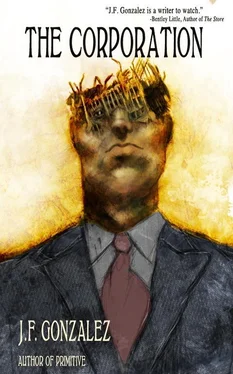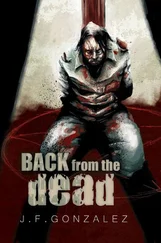“You mentioned earlier that you admit that working conditions in this country are growing worse,” Alan said. He glanced casually out at the parking lot as he spoke. “Longer hours, companies having less loyalty to their employees, drastic reduction of benefits. It’s been happening very gradually since 1980. And it’s been happening gradually to slowly acclimate the American Worker to this state. Prior to 1980, most employees in office jobs worked seven and a half hours and enjoyed a forty-five minute lunch break—a lunch break that was paid for, I might add. Now what’s the norm? Eight hour workdays minimum, an hour for lunch unpaid. Most people are putting in nine, ten, and twelve hour workdays, if not more. These longer workdays have become more common, and it’s been happening gradually. People in Germany and France work fewer hours than us and they’re more efficient.”
“And companies there have long promoted shorter working hours and more vacation days,” Rachel said. “They realize that a healthy, happy employee is a more productive employee.”
“They’re less apt to call in sick, there’s less turn-over, the burnout rate is much lower, and people do tend to be more productive when they’re not so stressed out,” Alan stated.
“That’s all changing over there, too,” Rachel said. She took a final drag on her cigarette and stubbed it out in the ashtray. “Corporate Financial has become global during the last ten years. They’re starting to change the way business is being run all over the world.”
“And they’re doing this simply because they want to be the dominant Corporate force in the world,” Michelle said, musing over everything Alan and Rachel had been telling her.
“You see how this is all taking place now, don’t you?” Alan asked. “How they’ve influenced our work structure, our government?”
“I guess,” Michelle said; she was still having a hard time believing it but, crazy as it sounded, it was all adding up.
“If it keeps up, pretty soon independent business will cease to exist,” Alan said. “Corporate Financial will keep swallowing company after company. Their influence will work its way into everybody who works for the companies they do business with. People who work for them will become slaves in the literal sense—they will only exist for the company they work for.”
“And the bigger they get, the stronger they’ll get,” Michelle said, running the figures and scenarios in her head and suddenly not liking it. She was connecting the dots now—the FCCs gradual relaxation of the rules in regulating competition among competitors, allowing rival companies to swallow the competition in buyouts, the drive to eliminate benefits in order to drive down costs, sending jobs overseas to drive down costs; and the result was those who pulled the strings getting richer and richer at the expense of the workers who poured their livelihood into their chosen trade.
“You see now,” Rachel said. She was looking at Michelle in a new light and Michelle realized the younger woman could tell she and Alan had gotten through to her.
“Yes, I do,” Michelle said, the implications so clear and terrifying now. “The bigger they get, the more power they’ll yield over everybody, especially thanks to all the deregulation. In fact, they probably already have control of the government.”
“Not completely, but it’s getting there,” Alan murmured.
“What happens if they succeed?” Michelle asked.
“At the rate things are going,” Alan said seriously, his features grave, tired. “We could see the global enslavement of the human race.”
SUNDAY WAS A whirlwind.
She went to sleep finally at 4:30 a.m., physically exhausted but mentally wired, still fretting over everything she’d learned. She tossed and turned for an hour and finally arose at 5:30 to take a sedative—she always traveled with them because she always slept badly when she was away from home on a business trip, and she dropped off like a stone fifteen minutes later. She finally arose at twelve-thirty p.m. to the ring-tone of her cellular.
She groped for it. “Hello?”
It was Donald. “Michelle, we’re here.”
“Where are you?” She forced herself to wake up. She sat up in bed.
“On the outskirts of the city. Jay’s driving. We’re going to find a cheap motel and check in. I’ll call you later.”
“Great!”
“Everything okay?”
“Yeah.” She rubbed her eyes. “Just… sleepy.”
“We’ll talk later, okay?”
“Yeah. I need to take a shower and wake up.”
The shower made her feel better, and as she was toweling her hair dry, Alan called. “Sam hasn’t called yet?”
“No.” She had slipped on a pair of panties and was wearing nothing else. “Will he?”
“He might try to get you to do some work. This is supposed to be a day off. If he does call, make an excuse.”
“I can tell him I have a migraine.”
“Better yet, tell him you’re gearing up for Monday. He’ll like that.”
Michelle nodded, inspecting herself in the mirror. Her hair was wet and lay limply against her shoulder blades. “In light of what I learned last night, I suppose he will.”
“How’d you sleep?”
“Terrible. I finally took a sleeping pill.”
“Feel rested enough?”
“I suppose.” She quickly debated on whether to tell him her boyfriend and Jay O’Rourke were in town, then decided to take the plunge. “Jay found out where I live and drove out while I was in El Paso. He felt I was the only person he could trust, that since I was new to Corporate Financial I must not be like the rest of them. And… with what you told me last night I can see now how perceptive he was.”
“I can see why you didn’t mention anything to us last night,” Alan said. “When I first became aware of what was going on, of what Corporate Financial was doing, I couldn’t believe it myself. I didn’t want to believe it; couldn’t believe what I was seeing and experiencing, but finally I had to see it for what it is. Plus, enough of my close friends and co-workers were experiencing the same things, although not to such a degree. And other friends… they started changing drastically, just like the people Rachel knew at Graham Electronics. Once I started looking into stuff on my own and connecting the dots, the evidence was there and I became a believer. I’ve become more of a believer once I got in with the Coalition.”
“And what’s your story?” Michelle asked.
“Similar to Rachel’s,” Alan said. She heard him sigh over the phone. “Only difference is I was a real yuppie. Got my BA and MBA from the University of Missouri in Kansas City, moved to Los Angeles and got a job at a brokerage firm. Met a woman there who I fell madly in love with. Her name was Susan Vickers. We were very much committed to each other. Susan and I moved in together and I thought everything was going great. It wasn’t until we were together for something like ten years that I realized she was not the person I thought she was. At the time I was very career-oriented, very much into what I did for a living, but I always made time for vacations and leisure. I couldn’t get Susan to do anything outside of work; had to practically pry her away from her desk at the office to get her to go on vacation with me. That’s when I started noticing the differences, both in my relationship with her and in the general business climate around me.”
“Was Corporate Financial Consultants working with your employer?” Michelle asked.
“Yes, they were. I didn’t make that connection right away at first. That came later. What happened first was I broke up with Susan. It was hard on me, harder than I thought it would be. She didn’t…” Alan sounded like he was trying to find the right words to say. “…take the breakup like I thought she would. It was like it didn’t faze her, like she didn’t care. That’s what hurt me the most, the fact that she didn’t seem to see that I was hurting inside and she didn’t really care about our relationship at all.”
Читать дальше












